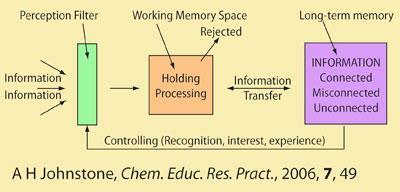How recent research gives us a greater insight into the learning process
The model of information processing in science proposed by Alex Johnstone in 1997 has frequently been used as a basis for discussing the effectiveness of different methods of teaching. According to the model, successful learning requires an efficient perception filter to select relevant information, a working memory for processing information, and a long-term memory for storing and for concept development. Helen St. Clair-Thompson, Tina Overton and Chris Botton of Hull University have revisited the model1 and looked at how recent research has helped us to have a greater insight into the learning process.

In terms of the perception filter, two distinct groups have been identified in terms of how they select what is relevant for a task. Those who are good at this are labelled as field independent, and those who struggle to select appropriate information are labelled as field dependent. Research has shown that students who are field independent are better at problem solving and perform better in assessments.
Another factor that relates to perception is selective attention. It is recommended that teachers use a variety of methods to capture students' attention, eg vocal variations, facial expressions, movement and gestures. Working memory has a limited capacity that can be increased by organising material into meaningful "chunks". Capacity can also be increased by using visual images and repetitive experiences with incremental complexity.
One of the most commonly accepted theories associated with long-term memory is that knowledge is stored in schemas - mental representations that help us store and simplify information. Useful strategies for improving long-term memory include helping students to organise information and encouraging them to regulate their own learning and experiment with self-explanations. Concept mapping or mind mapping are useful ways to help students organise knowledge.
The research highlights the importance of teaching students strategies of learning rather than assuming that they will develop these themselves.
References
- H. St Clair-Thompson, T. Overton, and C. Botton, Res. Sci. Technol. Educ., 2010, 28, 131-148 (DOI: 10.1080/02635141003750479)






No comments yet